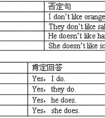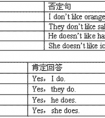词汇运用1. He often spends lots of time __________ with his friends online. (chat)2. Good _________with your trip to Hongkong. (luck)3. In my family everyon-七年级英语
The old man smiled before he replied to my question.
老人在回答我的问题前笑了笑。
I cannot answer you now. 我现在不能回答你。
How shall I answer? 我该怎样回答?
值得注意的是,answer可引申为“应答”之类的意义,这时不能用reply来代替。如:
answer the door (门铃响了)去开门
answer the telephone 接电话
名词在句中作主语,宾语,介词宾语,宾语补足语,表语以及名词短语作状语。
1.主语:The bagis in the desk.书包在桌子里边。
2.宾语:I washed my clothes yesterday. 昨天我洗了我的衣服。
3.表语:This is a good book. 这是一本好书。
4.宾语补足语We selected him our monitor.我们选他为我们的班长。
5.介词宾语Mary lives with her parents.玛丽和她的父母住在一起。
6.定语:She is a Partymember. 她是一位党员。
名词口诀:
一、人和事物各有名,万千名目可辨清。表示名称即名词,具体抽象有不同。
时间空间和地点,方向位置有专称。主宾定表都可作,名词具有多功能。
二、可数名词不可分,若要分离变性质。不可数名词可分离,一分再分仍原物。
英语名词特殊用法:
1.family指“家庭”时,强调全体;指“家里人”时强调个体,与住房无关
home指“家”,表示同一家庭共同生活的地方,具有感情色彩
Kate has left home for school.可作副词也可作名词,意思是“在家”
house指“住宅”、“住房”The Greens live in a big house.
2.man总称“人”、“人类”,用单数
people泛指“人们”,表示复数概念:People often work in the day.
指“人”的个体,但只表示复数概念:There are five people in my family.
前面加定冠词指“人民”,表示复数概念:Let’s work for the people.
指“民族”时,有单、复数之分:The Chinese people is a hardworking people.
person强调“人”的个体,有单、复数之分:There are five persons in my family.
3.police总称“警察”,表示复数概念:
policeman强调“警察”的个体,有单、复数之分:My father is a policeman.
4.universe指“宇宙万物”,强调物质概念:
When we talk about the universe,we mean the earth, the sun,the moon and many other stars.
space指“太空”、“宇宙空间”,强调空间概念:
Many countries have sent up the satellites into space.
“空间”、“余地”、“空地”:There is no space on the bus.
5.不同国家的人的单复数:
|
名称 |
总称(谓语用复数) |
一个人 |
两个人 |
|
中国人 |
the Chinese |
a Chinese |
two Chinese |
|
瑞士人 |
the Swiss |
a Swiss |
two Swiss |
|
澳大利亚人 |
the Australians |
an Australian |
two Australians |
|
俄国人 |
the Russians |
a Russian |
two Russians |
|
意大利人 |
the Italians |
an Italian |
two Italians |
|
希腊人 |
the Greek |
a Greek |
two Greeks |
|
法国人 |
the French |
a Frenchman |
two Frenchmen |
|
印度人 |
the Indians |
an Indian |
two Indians |
|
加拿大人 |
the Canadians |
a Canadian |
two Canadians |
|
德国人 |
the Germans |
a German |
two Germans |
|
英国人 |
the English |
an Englishman |
two Englishmen |
|
瑞典人 |
the Swedish |
a Swede |
two Swedes |
|
日本人 |
the Japanese |
a Japanese |
two Japanese |
|
美国人 |
the Americans |
a American |
two Americans |
考点名称:基数词
- 基数词:
表示数目多少或顺序多少的词叫数词,数词分为基数词和序数词。表示数目多少的数词叫基数词。 - 基数词的读法和写法:
(1).从1——10 one,two,three,four,five,six,seven,eight,nine,ten.
(2).从 11——19 eleven,twelve, thirteen, fourteen, fifteen, sixteen, seventeen,eighteen, nineteen.
这里除 eleven, twelve, thirteen, fifteen, eighteen为特殊形式外,fourteen,sixteen,seventeen,nineteen都是由其个位数形式后添加后缀-teen构成。
(3).从 20——99 整数几十中除twenty,thirty, forty,fifty,eighty为特殊形式外,sixty,seventy,ninety都是其个位数形式后添加后缀-ty构成。
表示几十几时,在几十和个位基数词形式之间添加连字符“-”
21读作: twenty-one ;76 读作:seventy-six
(4).百位数个数基数词形式加“hundred”,表示几百,在几十几与百位间加上and.
101 读作:a hundred and one; 320 读作:three hundred and twenty ;648读作: six hundred and forty-eight
(5).千位数以上 从数字的右端向左端数起,每三位数加一个逗号“,”。从右开始,第一个“,”前的数字后添加 thousand,第二个“,”前面的数字后添加 million,第三个“,”前的数字后添加 billion。然后一节一节分别表示,两个逗号之间最大的数为百位数形式。
2,648读作: two thousand six hundred and forty-eight
16,250,064读作: sixteen million two hundred and fifty thousand sixty-four
5,237,166,234读作: five billion,two hundred and thirty-seven million,one hundred and sixty-six thousand,two hundred and thirty-four
- 最新内容
- 相关内容
- 网友推荐
- 图文推荐
| [家长教育] 孩子为什么会和父母感情疏离? (2019-07-14) |
| [教师分享] 给远方姐姐的一封信 (2018-11-07) |
| [教师分享] 伸缩门 (2018-11-07) |
| [教师分享] 回家乡 (2018-11-07) |
| [教师分享] 是风味也是人间 (2018-11-07) |
| [教师分享] 一句格言的启示 (2018-11-07) |
| [教师分享] 无规矩不成方圆 (2018-11-07) |
| [教师分享] 第十届全国教育名家论坛有感(二) (2018-11-07) |
| [教师分享] 贪玩的小狗 (2018-11-07) |
| [教师分享] 未命名文章 (2018-11-07) |


![How much does it ______ to fly from Yancheng to Hainan Island?[ ]A. cost B. payC. spend D. take-七年级英语](http://www.00-edu.com/d/file/ks/4/2/shiyidongci/2020-01-05/small7dcf2f05998de63e10cc3629787031c81578210087.png)

![He always _____TV in the evening. He _____ listening to the radio. [ ]A. watch, don't like B. watches, doesn't like C. watching, don't like D. watch, do-七年级英语](http://www.00-edu.com/d/file/ks/4/2/shiyidongci/2020-01-05/small45d599b4a60b84e61cec210bfbf051f51578214524.png)
![I'd rather ___ to the Mcdonald's Restaurant because I like to listen to quiet music.[ ]A. to go B. going C. go D. went-八年级英语](http://www.00-edu.com/d/file/ks/4/2/shiyidongci/2020-01-05/small1767bba1727fef2c035c53dcbd9bc20e1578209517.png)
